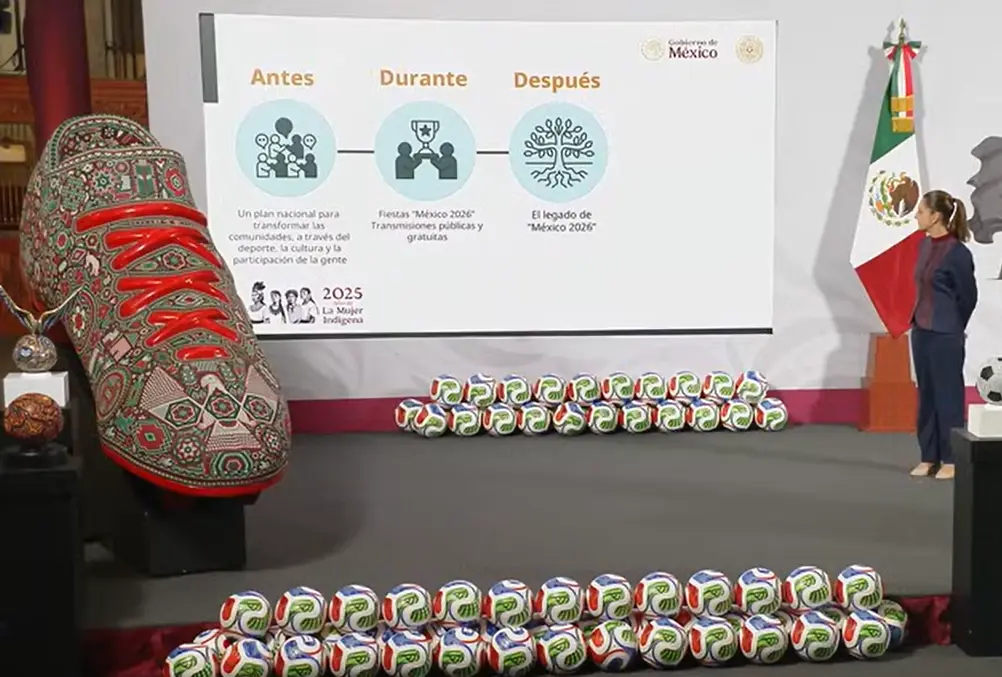
The Mexican government has launched the “Social World Cup,” a national strategy that aims to ensure that the 2026 FIFA World Cup does not remain confined to stadiums, but instead becomes a shared event in neighborhoods, plazas, and communities throughout the country.
With sports, cultural, educational, and recreational activities, the initiative seeks to allow millions of people to experience the spirit of soccer and ensure that the tournament leaves a lasting legacy.
President Claudia Sheinbaum Pardo emphasized during her morning press conference on November 18 that the 2026 World Cup is an opportunity to promote physical activity, restore public spaces, and strengthen collective identity.
“Soccer is the most important sport in our country. Girls and boys in every corner of Mexico choose it as their favorite. What do we want to do with the World Cup? We want it to be a celebration everywhere and also to leave a legacy: the importance of practicing sports, having fields across the country, and establishing permanent tournaments in schools,” she said.
At 205 days from the opening whistle, Gabriela Cuevas Barrón, coordinator of the Mexican government’s efforts for the World Cup, presented the actions that are contemplated in the “Social World Cup,” a program designed to democratize the soccer experience and ensure that the celebration is not limited to the host cities.
Cuevas Barrón explained that the goal is for “the balls to roll beyond the fields, for soccer to turn into mini-World Cups, tournaments, and even casual street matches in communities, and for the passion of the stadiums to be felt in public squares through free broadcasts.”
The initiative is part of Plan Mexico, which includes a federal government effort to position the country as the fifth most visited tourist destination in the world.
In addition to encouraging the arrival of visitors through offering cultural and sports activities, it seeks to stimulate the regional economy and modernize public spaces that will benefit society beyond the tournament.
Among its most ambitious goals is the organization of 177 Mexico 2026 Festivals, large-scale events that will combine music, food, match broadcasts, and family-friendly activities.
The plan also includes more than 5,000 activities and tourist routes available through the Conoce México app, designed to help both visitors and residents discover new destinations and cultural expressions.
The program also aims to encourage competition and community engagement. A total of 74 mini-World Cups will be organized in different categories, along with a Robotics Mini World Cup intended to bring young people closer to science and technology through the spirit of sports.
Other components include 1,483 activities under the “Live Healthy, Play Happy” program, focused on promoting healthy habits among school-aged children.
The vision of the project also includes a strong cultural component. The “Our Cultural Greatness” program will bring shows, workshops, lectures, and artistic activities to communities across the country. As part of this effort, 10,631 urban art murals will be painted, designed to reflect local identity and celebrate the role of soccer in social interaction.
In addition, the federal government announced the refurbishing of 4,208 fields and public spaces, which will not only provide communities with dignified places to play soccer, but also expand opportunities for daily physical activity.
“We are going to experience 29 days with 104 soccer matches,” Cuevas Barrón said. “While the host cities —Mexico City, Guadalajara, and Monterrey— will have the official FIFA Fan Festivals, the Mexican government will bring the soccer events to hundreds of plazas and public spaces so that all Mexicans can watch and enjoy the matches for free.”
With these actions, the goal is to ensure that the 2026 World Cup is not a distant event for those who cannot attend a stadium, but a collective celebration in which the entire country takes part. Through the “Social World Cup,” Mexico seeks to demonstrate that soccer is not only played on the field; it is also lived in the community, in culture, and in the possibility of building a legacy that goes beyond the games’ 90 minutes.
Related: Sheinbaum Presents the 2026 World Cup as Mexico Prepares to Welcome 5.5 Million Visitors